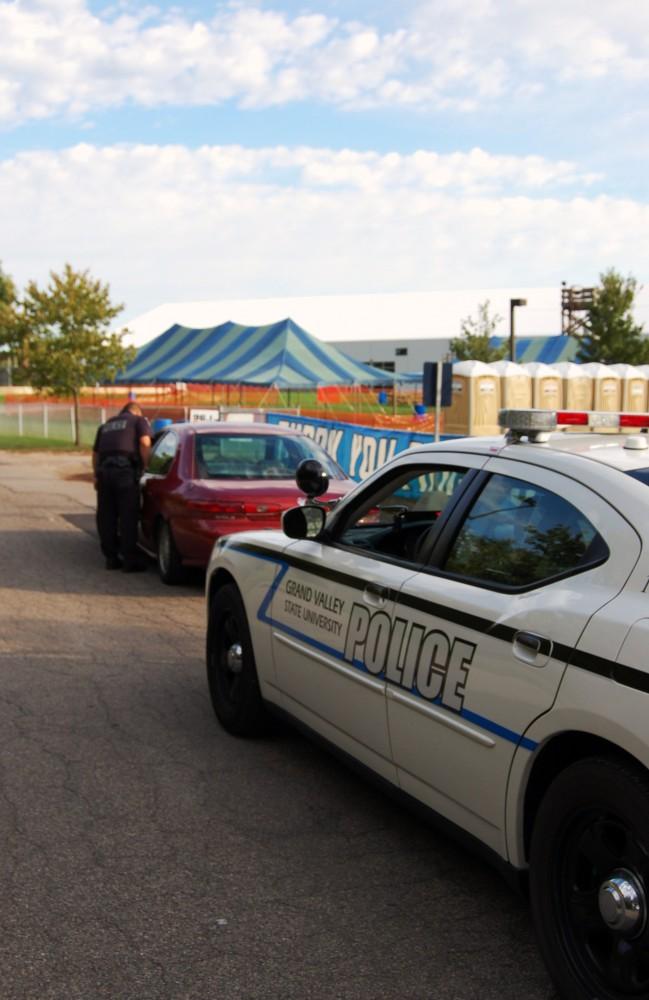DPS addresses pullover rights

A Grand Valley Police Officer executes a traffic stop on campus
Sep 23, 2010
From bicycles to cruisers and segway scooters, Grand Valley State University’s Department of Public Safety (DPS) has a variety of ways to patrol campus. But DPS’ suggested behavior code for pullovers remains the same, regardless of the vehicles involved.
During a traffic stop, DPS officers are trained to first ask for license, registration and proof of insurance before explaining the reason behind the stop.
Legally, it is an officer’s right to ask a driver or passengers to step out of the vehicle at any time during the stop, be it for safety reasons or suspicion of the presence of illegal contraband inside of the vehicle.
Once the officer has evaluated the scene, they will likely return to their patrol car to electronically verify the driver’s license and registration, as well as fill out any citations.
“If you don’t agree with a citation, don’t argue at the scene,” the DPS website advises. “All citizens have the right to contest a citation before a judge or magistrate. This doesn’t require the service of an attorney, and the time involved is often minimal.”
Although DPS cannot give specific legal advice to students, the department generally advises remaining calm and cooperative with officers and not attempting to flee the scene under any circumstances. In the state of Michigan, anyone who resists arrest, obstructs of assaults a police officer potentially faces a two-year felony sentence or a $2,000 fine.
“Running away from the officers exasperates the issue,” said Assistant Director of DPS Capt. Brandon DeHaan. “…It raises the ante and turns whatever the issue was into a resisting and opposing charge, which is a felony. Usually for tickets or citations, the person gets to go home. But with a resisting charge, you will be booked at the Ottawa County Jail.”
The majority of citations written up by DPS are for liquor law violations. A first-time minor in possession charge is a misdemeanor that typically results in a $100 fine. GVSU students must then complete a three-hour session with the Alcohol Campus Education Services (ACES) group.
“It’s non-judgmental,” said ACES Director Eric Klingensmith of the group. “It’s educational. It’s not about you’re right or wrong or you even have a problem. What we really emphasize right up front is that you’re here because you broke a rule or the law and it’s not about we think you’re an alcoholic or we think you have a drinking problem, but rather, you broke a rule and we want to take an opportunity to give you some information.”
Klingensmith added the group also explains to first-time offenders what typically happens to those charged with a second MIP and stresses the consequences of repeat MIP charges.
A second-time MIP charge also carries a fine, and the university typically requires the offender to undergo an assessment at the Counseling Center.
“The counselor would say, ‘Based on our meeting, this is what we’re seeing, here are some risk factors, here are some things that might indicate you’re in some danger’ or ‘You know what, yeah, you really were in the wrong place at the wrong time, but here’s still some information just to keep you aware,’” Klingensmith explained.
Klingemsith said GVSU handles a third MIP charge on a “case-by-case basis.” ACES sponsors a variety of programs for students who want to seek additional counseling or support for alcohol problems or those affected by a loved one’s drinking, including Al-Anon, Students Staying Sober and 12-step meetings. For more information on meeting times and specific programs, visit www.gvsu.edu/aces.

























